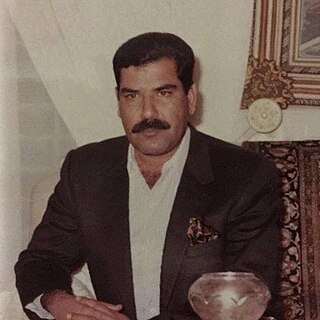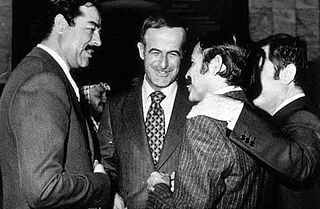
Saddam Hussein Abd al-Majid al-Tikriti was an Iraqi politician and revolutionary who served as the fifth president of Iraq from 1979 to 2003. He also served as prime minister of Iraq from 1979 to 1991 and later from 1994 to 2003. He was a leading member of the revolutionary Arab Socialist Ba'ath Party, and later, the Baghdad-based Ba'ath Party and its regional organization, the Iraqi Ba'ath Party, which espoused Ba'athism, a mix of Arab nationalism and Arab socialism.

Iraq under the Arab Socialist Ba'ath Party saw severe violations of human rights. Secret police, state terrorism, torture, mass murder, genocide, ethnic cleansing, rape, deportations, extrajudicial killings, forced disappearances, assassinations, chemical warfare, and the destruction of the Mesopotamian marshes were some of the methods Saddam Hussein and the country's Ba'athist government used to maintain control. Saddam committed crimes of aggression during the Iran–Iraq War and the Gulf War, which violated the Charter of the United Nations. The total number of deaths and disappearances related to repression during this period is unknown, but is estimated to be at least 250,000 to 290,000 according to Human Rights Watch, with the great majority of those occurring as a result of the Anfal genocide in 1988 and the suppression of the uprisings in Iraq in 1991. Human Rights Watch and Amnesty International issued regular reports of widespread imprisonment and torture.

Izzat Ibrahim al-Douri was an Iraqi politician and army field marshal. He served as Vice Chairman of the Iraqi Revolutionary Command Council until the 2003 U.S. invasion of Iraq and was regarded as the closest advisor and deputy under President Saddam Hussein. He led the Iraqi insurgent group Naqshbandi Army.

Watban Ibrahim al-Nasiri was the Interior Minister of Iraq. He was the half-brother of Saddam Hussein and the brother of Barzan al-Tikriti. He was taken into coalition custody 13 April 2003, following his capture as he tried fleeing to Syria. He died in prison of natural causes in 2015.

Ayatollah al-Sayyid Muhammad Baqir Muhsin al-Hakim at-Tabataba'i, also known as Shaheed al-Mehraab, was a senior Iraqi Shia Islamic Scholar and the leader of the Supreme Council for Islamic Revolution in Iraq (SCIRI). Al-Hakim spent more than 20 years in exile in Iran and returned to Iraq on 12 May 2003. Al-Hakim was a contemporary of Ayatollah Khomeini, and The Guardian compared the two in terms of their times in exile and their support in their respective homelands. After his return to Iraq, al-Hakim's life was in danger because of his work to encourage Shiite resistance to Saddam Hussein and from a rivalry with Muqtada al-Sadr, the son of the late Ayatollah Mohammed Sadeq al-Sadr, who had himself been assassinated in Najaf in 1999. Al-Hakim was assassinated in a bomb attack in Najaf in 2003 when aged 63 years old. At least 75 others in the vicinity also died in the bombing.
The Iraqi Revolutionary Command Council was established after the military coup in 1968, and was the ultimate decision-making body in Iraq before the American-led invasion in 2003. It exercised both executive and legislative authority in the country, with the Chairman and Vice Chairman chosen by a two-thirds majority of the council. The Chairman was also then declared the President of Iraq and he was then allowed to select a Vice President. After Saddam Hussein became President of Iraq in 1979 the council was led by deputy chairman Izzat Ibrahim ad-Douri, deputy Prime Minister Tariq Aziz, and Taha Yassin Ramadan, who had known Saddam since the 1960s.

The trial of Saddam Hussein was the trial of the deposed President of Iraq Saddam Hussein by the Iraqi Interim Government for crimes against humanity during his time in office.
Abd ar-Razzaq Said al-Naif was an Iraqi military officer and general and was briefly Prime Minister of Iraq during 1968 until he was deposed. He was assassinated on orders of Saddam Hussein.
Sectarian violence in Iraq refers to the violence that developed as a result of rising sectarian tensions between the different religious and ethnic groups of Iraq, most notably the conflict between the Shi'i Muslim majority and the Sunni Muslim minority within the country. With the creation of a modern nation-state, sectarian tensions arose slowly and eventually developed into recent violent conflicts such as the War in Iraq (2013–2017) and the Iraqi civil war (2006–2008).
The mass media in Iraq includes print, radio, television, and online services. Iraq became the first Arab country to broadcast from a TV station, in 1954. As of 2020, more than 100 radio stations and 150 television stations were broadcasting to Iraq in Arabic, English, Kurdish, Turkmen, and Neo-Aramaic.

After World War I, Iraq passed from the failing Ottoman Empire to British control. Kingdom of Iraq was established under the British Mandate in 1932. In the 14 July Revolution of 1958, the king was deposed and the Republic of Iraq was declared. In 1963, the Ba'ath Party staged a coup d'état and was in turn toppled by another coup in the same year, but managed to retake power in 1968. Saddam Hussein took power in 1979 and ruled Iraq for the remainder of the century, during the Iran–Iraq War of the 1980s, the Invasion of Kuwait and the Gulf War of 1990 to 1991 and the UN sanction during the 1990s. Saddam was removed from power in the 2003 invasion of Iraq.

Ba'athist Iraq, officially the Iraqi Republic (1968–1992) and later the Republic of Iraq (1992–2003), was the Iraqi state between 1968 and 2003 under the rule of the Arab Socialist Ba'ath Party. This period began with high economic growth, but ended with the country facing severe levels of socio-political isolation and economic stagnation. By the late 1990s, the average annual income had decreased drastically due to a combination of external and internal factors. UNSC sanctions against Iraq, in particular, were widely criticized for negatively impacting the country's quality of life, prompting the establishment of the Oil-for-Food Programme. The Ba'athist period formally came to an end with the 2003 invasion of Iraq, and the Ba'ath Party has since been indefinitely banned across the country.
Nadhim Kzar was the first head of the Iraqi Directorate of General Security.

The Arab Socialist Ba'ath Party, also referred to as the pro-Iraqi Ba'ath movement, is a neo-Ba'athist political party which was headquartered in Baghdad, Iraq, until 2003. It is one of two parties which emerged from the 1966 split of the original Ba'ath Party.

The Arab Socialist Ba'ath Party – Iraq Region, officially the Iraqi Regional Branch, is an Iraqi Ba'athist political party founded in 1951 by Fuad al-Rikabi. It was the Iraqi regional branch of the original Ba'ath Party before changing its allegiance to the Iraqi-dominated Ba'ath movement following the 1966 split within the original party. The party was officially banned following the American invasion of Iraq in 2003, but despite this it still continues to function underground.

The 17 July Revolution was a bloodless coup in Iraq in 1968 led by Ahmed Hassan al-Bakr, Abd ar-Razzaq an-Naif, and Abd ar-Rahman al-Dawud that ousted President Abdul Rahman Arif and Prime Minister Tahir Yahya and brought the Iraqi Regional Branch of the Arab Socialist Ba'ath Party to power. Ba'athists involved in the coup as well as the subsequent purge of the moderate faction led by Naif included Hardan al-Tikriti, Salih Mahdi Ammash, and Saddam Hussein, the future President of Iraq. The coup was primarily directed against Yahya, an outspoken Nasserist who exploited the political crisis created by the June 1967 Six-Day War to push Arif's moderate government to nationalize the Western-owned Iraq Petroleum Company (IPC) in order to use Iraq's "oil as a weapon in the battle against Israel." Full nationalization of the IPC did not occur until 1972, under the Ba'athist administration. In the aftermath of the coup, the new Iraqi government consolidated power by denouncing alleged American and Israeli machinations, publicly executing 14 people including 9 Iraqi Jews on fabricated espionage charges amidst a broader purge, and working to expand Iraq's traditionally close relations with the Soviet Union.
The Tulfah family was the family of Saddam Hussein of Ba'athist Iraq who ruled from 1979 to 2003 and established a single party authoritarian government under the control of the Ba'ath Party until the invasion by US/UK forces in 2003.
Events from the year 1991 in Jordan.

The 1979 Ba'ath Party Purge or Comrades Massacre was a public purge of the Iraqi Ba'ath Party orchestrated on 22 July 1979 by then-president Saddam Hussein six days after his arrival to the presidency of the Iraqi Republic on 16 July 1979.
Women's sport in Iraq has a long history, with many sports being played. Football (soccer) is among the most popular sport and hobby in Iraq. Many also participate in, but are not limited to, basketball, volleyball, tennis, taekwondo, and weightlifting. It is often seen as taboo when women involve in sports and other recreations as it is seen as inappropriate by the large conservative culture, yet in the Kurdistan region as well as the more urban cities of Iraq, such as Baghdad or Basra, society has become more accepting and supportive over time. Women are encouraged to dress and behave modestly, so the involvement of women in sports and the wearing of sports uniforms have been widely seen as taboo. Even with the growing support of women in sports, societal expectations still lead many women to play in secret or avoid sports altogether, which makes it harder for women to get involved in professional sports. Iraq was, at one point, a hub for athletics in the Middle East, but during Saddam Hussein's reign, involvement in sports declined. Sports in Iraq have faced many challenges over the past years, and only recently have sports committees and athletes, both men and women alike, begun to rebuild teams and strengthen involvement. Even then, the Ministry of Youth and Sports are often responsible for sponsoring sports teams and athletes, but they often lack the financial means to fully support them. The country's unstable history of dictatorship and war, as well as the growing trend of conservatism, have been recognized as reasons for weak, lacking, and in some cases nonactive and even nonexistent women's sports teams.











